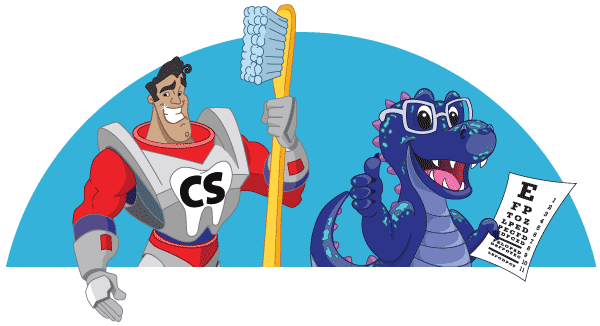There are a lot of exciting changes with your child’s teeth and mouth—plus lots of visits from the tooth fairy—when they are between the ages of 6 and 12 years old. Along with navigating elementary school, your child is becoming better at brushing and flossing their teeth by themselves during this timeframe. In addition to your child learning how to take care of their teeth, here are some milestones, healthy habits and what you need to know about dental health from your dentist that accepts Medicaid and treats children.
Milestones
When your child loses their first tooth, it’s almost as exciting as when they had a tooth pop through their gums for the very first time when they were a baby. Most children have 20 baby teeth (also called primary teeth). Starting at around age 6 and continuing through age 12, children will lose these baby teeth. The baby teeth are replaced by 32 adult (or permanent) teeth.
The first adult teeth that come in for most children are the first molars. These don’t replace a baby tooth, but they are part of the additional 12 adult teeth kids get during this time. After the first molars break through the gums, adult teeth most often cause the baby teeth to loosen and then take their place starting with the front of the mouth and continuing to the back over time.
During this time of rapid changes, your child’s dental appearance will evolve, and sometimes the various stages aren’t pretty. From missing their two front teeth to having a mix of baby and adult teeth—that often seem too large for your child’s mouth—things can look a bit chaotic in your child’s mouth.
Healthy Habits
Children should continue to brush with a fluoride toothpaste for at least two minutes in the morning and again at night. Flossing daily between any teeth that are touching is the recommendation from your dentist that accepts Medicaid and treats children. During this stage of development, baby teeth need to remain healthy to give adult teeth a good start to last a lifetime.
During this period, sealants can help protect your kid’s teeth from cavities. Sealants protect the chewing surface of molars and are often recommended by a dentist that accepts Medicaid to stop the early stages of tooth decay from becoming a cavity. Sealants can prevent 80 percent of cavities in the back teeth where most cavities occur. Even with good brushing and flossing the bacteria that’s responsible for tooth decay can get into the grooved recesses of your child’s teeth. Children without sealants are three times more likely to have cavities in molars than kids with sealants.
Routine check-ups are important for everyone with teeth, but during this time the dentist that accepts Medicaid will monitor incorrect teeth positions or bite issues so that orthodontic treatment can begin if necessary. Regular dental visits are the best way to ensure your child’s teeth and mouth remain healthy.
Healthy Habits
Children should continue to brush with a fluoride toothpaste for at least two minutes in the morning and again at night. Flossing daily between any teeth that are touching is the recommendation from your dentist that accepts Medicaid and treats children. During this stage of development, baby teeth need to remain healthy to give adult teeth a good start to last a lifetime.
During this period, sealants can help protect your kid’s teeth from cavities. Sealants protect the chewing surface of molars and are often recommended by a dentist that accepts Medicaid to stop the early stages of tooth decay from becoming a cavity. Sealants can prevent 80 percent of cavities in the back teeth where most cavities occur. Even with good brushing and flossing the bacteria that’s responsible for tooth decay can get into the grooved recesses of your child’s teeth. Children without sealants are three times more likely to have cavities in molars than kids with sealants.
Routine check-ups are important for everyone with teeth, but during this time the dentist that accepts Medicaid will monitor incorrect teeth positions or bite issues so that orthodontic treatment can begin if necessary. Regular dental visits are the best way to ensure your child’s teeth and mouth remain healthy.
What You Need to Know
The American Association of Orthodontists suggests every child have an orthodontic evaluation by age 7. Orthodontists will check your child’s oral development and how teeth are lining up. They will review X-rays to see if your child has enough room for all adult teeth and if there are any issues under the gums to worry about. When issues are caught early, they are much easier to treat. Orthodontics is more than helping your child have straight teeth, it can help correct bite issues, crooked teeth that impact chewing and prevent bigger problems down the road. Schedule an orthodontic evaluation near you.
Adults must still supervise a child’s toothbrushing and flossing in between dentist visits. Special care should be taken around sensitive areas or loose teeth.
Allow baby teeth to fall out naturally. Your child can “wiggle” a loose tooth, but they should never try to pull it out before it’s ready to fall out because that could injure nearby teeth or gums and cause infection and pain.
Some adult teeth may never cause the baby tooth it’s replacing to get loose. In cases where an adult tooth breaks through the gums without causing the baby tooth to get loose, a dentist that accepts Medicaid will need to evaluate to see if they need to help remove the baby tooth.
Even though chewing can be difficult during this time period when teeth are being lost and new ones aren’t quite in, it’s important that your child stick to eating healthy foods.
Many children start sports during these years as well. Make sure your child has a mouthguard when they play any contact sport to protect their teeth.
 Skip to main content
Skip to main content














